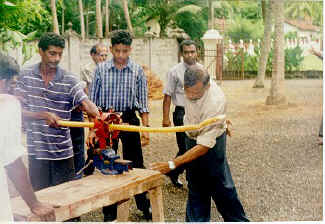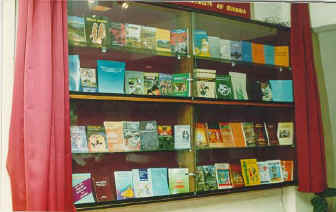| Achievements in Research & Communication | ||||||||
Sri Lanka is the largest producer of cinnamon in the world, accounting for about 70 % of the global production, and the most of the national cinnamon production comes from Ruhuna. Because of its aromatic, carminative and digestive properties, it has wide applications in food, beverage, liqueur and perfumery industries. Due to growing concern of health hazards of synthetic food flavours, there is burgeoning demand for cinnamon in the food industry. Thus its future will be bright. However, the cinnamon industry is constrained due to prohibitive cost of processing, which contributes to about 60% of the cost of production. This has been further exacerbated due to the dearth of skilled peelers. We are pleased to report that as a result of the investigations carried out by the Dept. of Agricultural Engineering under the direction and guidance of Prof. K.D.N. Weerasinghe, the rubbing process has been mechanized, considerably reducing the involvement of labour and adding to the quality of quills. This is undoubtedly an important contribution by the Faculty of Agriculture in strengthening the cinnamon industry in Sri Lanka. Prof. Weerasinghe and Mr. C.P. Gunasena have already patented it and several machines have been sold at Rs. 7500 apiece. We congratulate him and his team for the above achievement and look forward to more such technological innovations.
We are pleased to report that two of the eight merit awards given by the National Science Foundation in 2001 to its outstanding grantees have been bagged by Dr. C.A.N. Fernando of the Dept. of Physics and Dr. P.L.A.G. Alwis of the Dept. of Agricultural Engineering. Their research which is of high applied value dealt with development of low-cost, high-efficiency photovoltaic cells and development of swinging lugs with reversible cage wheels for small and medium power tractors, respectively. We congratulate them and wish them further success in their future research endeavors. We hope to see more Ruhuna dons receiving such awards in the future. In addition, a fair number of Ruhuna University teachers won presidential research awards in the last two years in view of their outstanding publications in internationally renowned journals, and several senior dons from this University have held the presidency of several key professional bodies in Sri Lanka, i.e. Prof. Anoja Fernando, the past President of Sri Lanka Medical Association, Prof. Morley de Silva, the past President of the Institute of Biology, Prof. W.W.G. Dharmaratne, the President of the Institute of Physics and Dr. B.G. Nanayakkara, the President (Elect), Sri Lanka Dental Association.
It is with a sense of gratification we report that over 100 books have been written/edited by the academics of the University in a wide variety of fields such as agriculture, arts, botany, Buddhism, economics, environment, geography, history, medicine, political science, sociology etc. Among these are valuable source books, text books, novels, atlases etc. Samples of these books are on display at the University and it is hoped that it would administer a stimulus to the staff to publish still more.
As a result
of dedicated research on filariasis (Barawa rogaya)
Rapid advances made in reproductive
biology have given In keeping with this need, Prof. Tilak Weerasooriya took the initiative to establish a Reproductive Biology Laboratory in 1998 at the Dept. of Anatomy of the Faculty of Medicine. This RBL has made considerable progress in the past few years, which has resulted in the establishment of a sperm bank and an Endocrine Investigation Laboratory. This RBL now conducts special treatment programmes and relevant investigations holding out new hopes for infertile couples. In view of its progress and achievements, the First National In-vitro Fertilization Centre (Test Tubes Babies) will be established at the Teaching Hospital at Mahmodera, Galle, drawing upon the expertise available in the Faculty of Medicine. More information about the services offered by the RBL can be obtained from Prof. Tilak Weerasooriya (Tel: 09- 46873, e-mail: trichard@sltnet.lk ).
|
A showcase of books written by the university staff |
|||||||

